人教版九年级全册Unit 12Life is full of the unexpected.Period 2(Section A 3a-3c)知识点课件(共12张PPT)
文档属性
| 名称 | 人教版九年级全册Unit 12Life is full of the unexpected.Period 2(Section A 3a-3c)知识点课件(共12张PPT) | 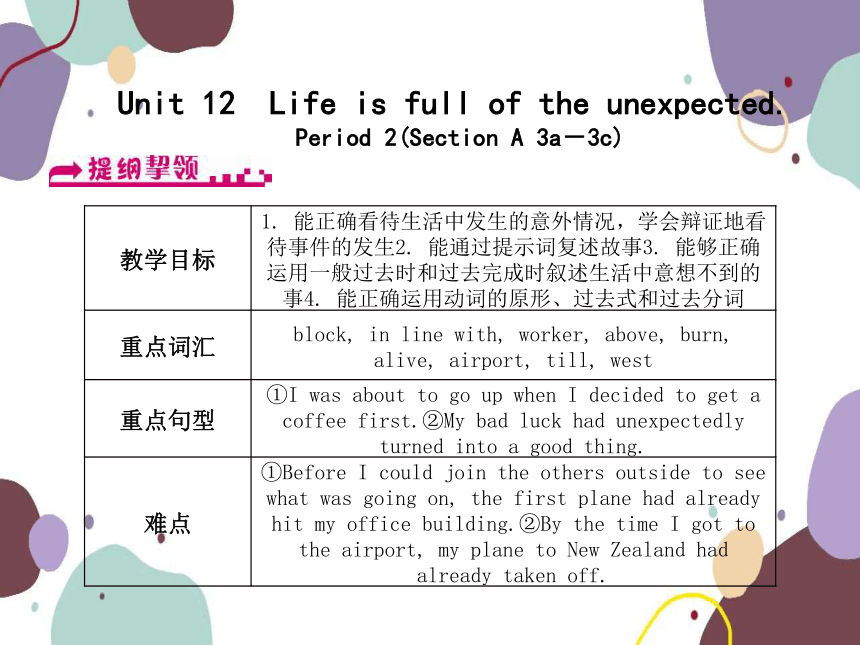 | |
| 格式 | pptx | ||
| 文件大小 | 218.8KB | ||
| 资源类型 | 教案 | ||
| 版本资源 | 人教新目标(Go for it)版 | ||
| 科目 | 英语 | ||
| 更新时间 | 2022-10-19 11:59:48 | ||
图片预览

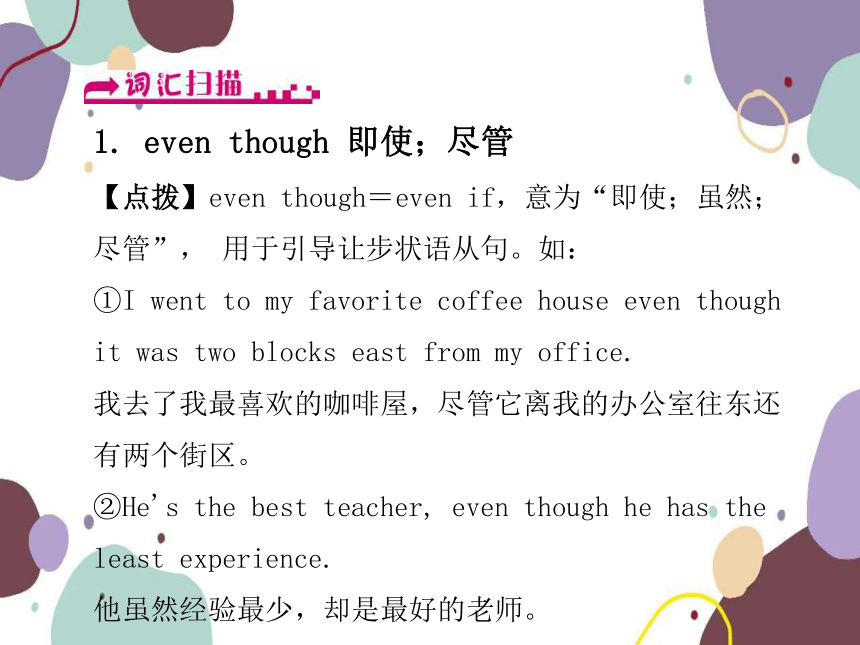
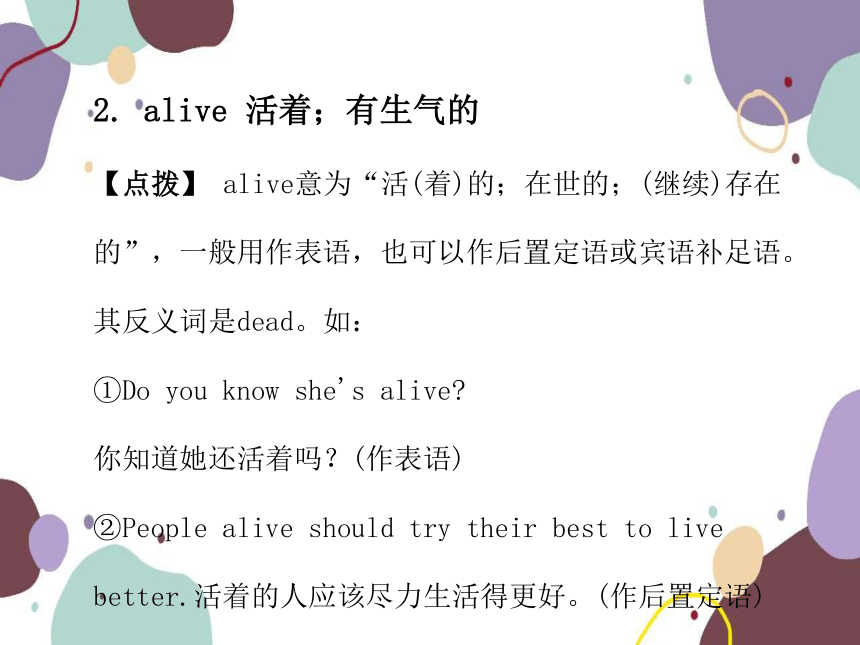
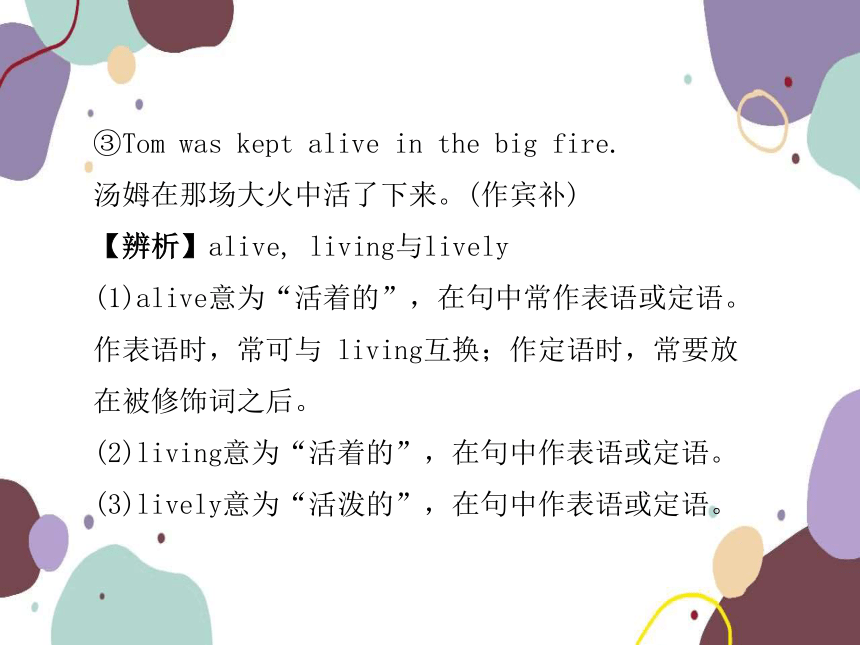
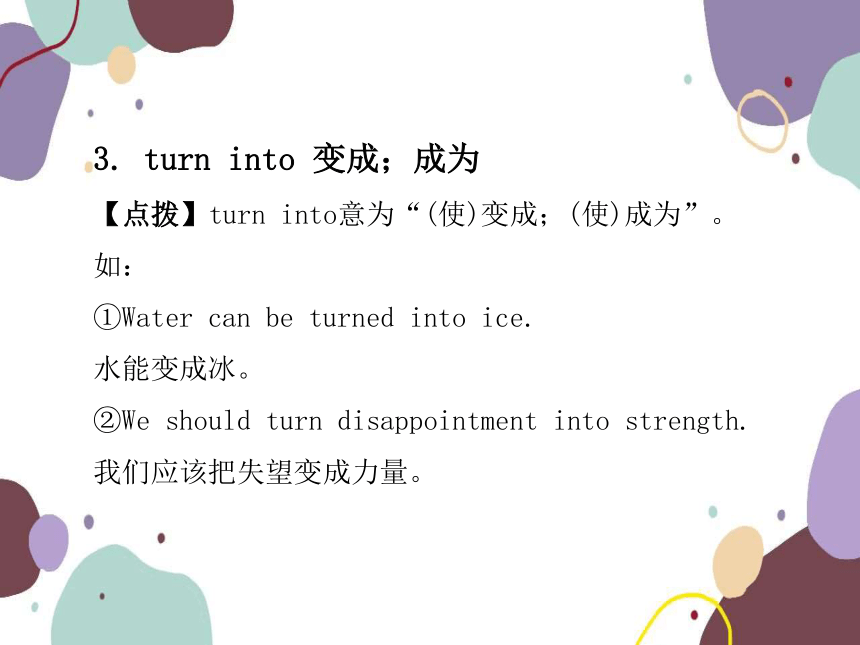
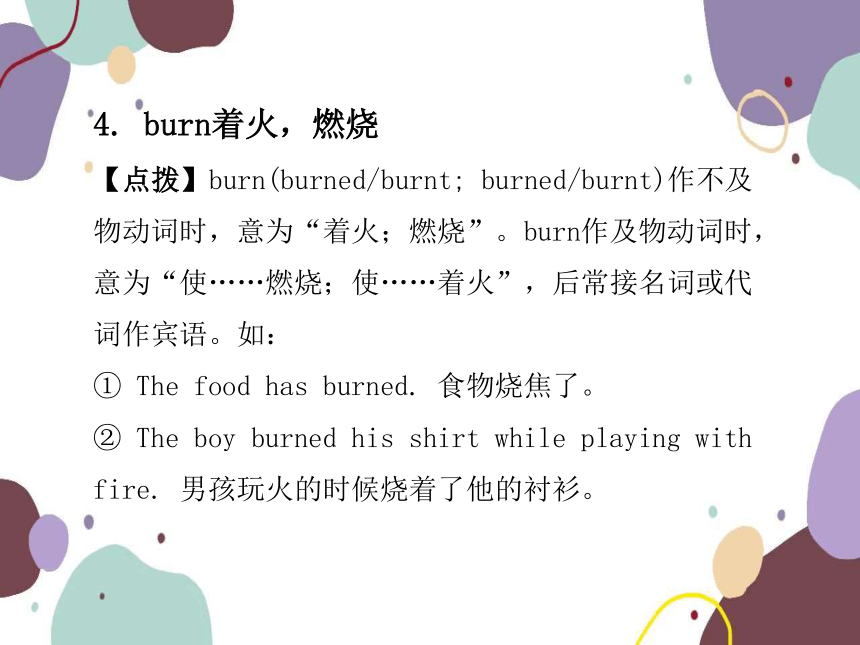
文档简介
(共12张PPT)
Unit 12 Life is full of the unexpected.
Period 2(Section A 3a-3c)
教学目标 1. 能正确看待生活中发生的意外情况,学会辩证地看待事件的发生2. 能通过提示词复述故事3. 能够正确运用一般过去时和过去完成时叙述生活中意想不到的事4. 能正确运用动词的原形、过去式和过去分词
重点词汇 block, in line with, worker, above, burn, alive, airport, till, west
重点句型 ①I was about to go up when I decided to get a coffee first.②My bad luck had unexpectedly turned into a good thing.
难点 ①Before I could join the others outside to see what was going on, the first plane had already hit my office building.②By the time I got to the airport, my plane to New Zealand had already taken off.
1. even though 即使;尽管
【点拨】even though=even if,意为“即使;虽然;尽管”, 用于引导让步状语从句。如:
①I went to my favorite coffee house even though it was two blocks east from my office.
我去了我最喜欢的咖啡屋,尽管它离我的办公室往东还有两个街区。
②He's the best teacher, even though he has the least experience.
他虽然经验最少,却是最好的老师。
2. alive 活着;有生气的
【点拨】 alive意为“活(着)的;在世的;(继续)存在的”,一般用作表语,也可以作后置定语或宾语补足语。其反义词是dead。如:
①Do you know she's alive
你知道她还活着吗?(作表语)
②People alive should try their best to live better.活着的人应该尽力生活得更好。(作后置定语)
③Tom was kept alive in the big fire.
汤姆在那场大火中活了下来。(作宾补)
【辨析】alive, living与lively
(1)alive意为“活着的”,在句中常作表语或定语。作表语时,常可与 living互换;作定语时,常要放在被修饰词之后。
(2)living意为“活着的”,在句中作表语或定语。
(3)lively意为“活泼的”,在句中作表语或定语。
3. turn into 变成;成为
【点拨】turn into意为“(使)变成;(使)成为”。如:
①Water can be turned into ice.
水能变成冰。
②We should turn disappointment into strength.
我们应该把失望变成力量。
4. burn着火,燃烧
【点拨】burn(burned/burnt; burned/burnt)作不及物动词时,意为“着火;燃烧”。burn作及物动词时,意为“使……燃烧;使……着火”,后常接名词或代词作宾语。如:
① The food has burned. 食物烧焦了。
② The boy burned his shirt while playing with fire. 男孩玩火的时候烧着了他的衬衫。
1. We stared in disbelief at the black smoke rising above the burning building.我们难以置信地盯着黑烟从燃烧的大楼里冒出来。
【点拨】(1)stare是动词,意为“盯着看;凝视”,表示看得比较仔细,有时也表示带有吃惊的意味去看,常与at, into连用。如:
Don't stare at me like that.
别那样盯着我看。
(2)in disbelief 意为“不相信;疑惑;怀疑”。如:
She looked at him in disbelief.
她全然不信地看着他。
(3)above 有如下几种含义:
1)作介词,表示位置,意为“在……上方;高于”,与 below相对。如:
He lifted his hands above his head.
他将双手举过头顶。
2)作介词,还表示在地位、级别、能力、资历、重要性等方面“超过;在……之上;比……强”。如:
He is above the others in ability.
他的能力高于其他人。
3)作副词,意为“在上面”。如:
See the examples given above.
见上述例子。
2. I was about to go up when I decided to get a coffee first.
我将上去时突然决定先去买杯咖啡。
【点拨】(1)be about to意为“即将”。如:
He was about to leave when the telephone rang.
他即将离开时电话突然响了。
(2)decide是及物动词,意为“决定;下决心”,常用结构:decide sth.决定某事;decide to do sth.决定做某事;decide+that从句,决定……。
如:①I can't decide anything at the moment.
此刻我不能做出任何决定。
②He decided to learn medicine.
他决定学医。
③I decided that I would tell you about it.
我决定要告诉你那件事。
【延伸】decision是名词,意为“决定;决心”,make a decision意为“做决定;下决心”。常用短语:decide to do sth.意为“决定做某事”,相当于make a decision to do sth.。如:
He made a decision to go abroad.
=He decided to go abroad.
他决定出国。
Unit 12 Life is full of the unexpected.
Period 2(Section A 3a-3c)
教学目标 1. 能正确看待生活中发生的意外情况,学会辩证地看待事件的发生2. 能通过提示词复述故事3. 能够正确运用一般过去时和过去完成时叙述生活中意想不到的事4. 能正确运用动词的原形、过去式和过去分词
重点词汇 block, in line with, worker, above, burn, alive, airport, till, west
重点句型 ①I was about to go up when I decided to get a coffee first.②My bad luck had unexpectedly turned into a good thing.
难点 ①Before I could join the others outside to see what was going on, the first plane had already hit my office building.②By the time I got to the airport, my plane to New Zealand had already taken off.
1. even though 即使;尽管
【点拨】even though=even if,意为“即使;虽然;尽管”, 用于引导让步状语从句。如:
①I went to my favorite coffee house even though it was two blocks east from my office.
我去了我最喜欢的咖啡屋,尽管它离我的办公室往东还有两个街区。
②He's the best teacher, even though he has the least experience.
他虽然经验最少,却是最好的老师。
2. alive 活着;有生气的
【点拨】 alive意为“活(着)的;在世的;(继续)存在的”,一般用作表语,也可以作后置定语或宾语补足语。其反义词是dead。如:
①Do you know she's alive
你知道她还活着吗?(作表语)
②People alive should try their best to live better.活着的人应该尽力生活得更好。(作后置定语)
③Tom was kept alive in the big fire.
汤姆在那场大火中活了下来。(作宾补)
【辨析】alive, living与lively
(1)alive意为“活着的”,在句中常作表语或定语。作表语时,常可与 living互换;作定语时,常要放在被修饰词之后。
(2)living意为“活着的”,在句中作表语或定语。
(3)lively意为“活泼的”,在句中作表语或定语。
3. turn into 变成;成为
【点拨】turn into意为“(使)变成;(使)成为”。如:
①Water can be turned into ice.
水能变成冰。
②We should turn disappointment into strength.
我们应该把失望变成力量。
4. burn着火,燃烧
【点拨】burn(burned/burnt; burned/burnt)作不及物动词时,意为“着火;燃烧”。burn作及物动词时,意为“使……燃烧;使……着火”,后常接名词或代词作宾语。如:
① The food has burned. 食物烧焦了。
② The boy burned his shirt while playing with fire. 男孩玩火的时候烧着了他的衬衫。
1. We stared in disbelief at the black smoke rising above the burning building.我们难以置信地盯着黑烟从燃烧的大楼里冒出来。
【点拨】(1)stare是动词,意为“盯着看;凝视”,表示看得比较仔细,有时也表示带有吃惊的意味去看,常与at, into连用。如:
Don't stare at me like that.
别那样盯着我看。
(2)in disbelief 意为“不相信;疑惑;怀疑”。如:
She looked at him in disbelief.
她全然不信地看着他。
(3)above 有如下几种含义:
1)作介词,表示位置,意为“在……上方;高于”,与 below相对。如:
He lifted his hands above his head.
他将双手举过头顶。
2)作介词,还表示在地位、级别、能力、资历、重要性等方面“超过;在……之上;比……强”。如:
He is above the others in ability.
他的能力高于其他人。
3)作副词,意为“在上面”。如:
See the examples given above.
见上述例子。
2. I was about to go up when I decided to get a coffee first.
我将上去时突然决定先去买杯咖啡。
【点拨】(1)be about to意为“即将”。如:
He was about to leave when the telephone rang.
他即将离开时电话突然响了。
(2)decide是及物动词,意为“决定;下决心”,常用结构:decide sth.决定某事;decide to do sth.决定做某事;decide+that从句,决定……。
如:①I can't decide anything at the moment.
此刻我不能做出任何决定。
②He decided to learn medicine.
他决定学医。
③I decided that I would tell you about it.
我决定要告诉你那件事。
【延伸】decision是名词,意为“决定;决心”,make a decision意为“做决定;下决心”。常用短语:decide to do sth.意为“决定做某事”,相当于make a decision to do sth.。如:
He made a decision to go abroad.
=He decided to go abroad.
他决定出国。
同课章节目录
- Unit 1 How can we become good learners.
- Section A
- Section B
- Unit 2 I think that mooncakes are delicious!
- Section A
- Section B
- Unit 3 Could you please tell me where the restroom
- Section A
- Section B
- Unit 4 I used to be afraid of the dark.
- Section A
- Section B
- Unit 5 What are the shirts made of?
- Section A
- Section B
- Review of Units 1-5
- Unit 6 When was it invented?
- Section A
- Section B
- Unit 7 Teenagers should be allowed to choose their
- Section A
- Section B
- Unit 8 It must belong to Carla.
- Section A
- Section B
- Unit 9 I like music that I can dance to.
- Section A
- Section B
- Unit 10 You're supposed to shake hands.
- Section A
- Section B
- Review of Units 6-10
- Unit 11 Sad movies make me cry.
- Section A
- Section B
- Unit 12 Life is full of the unexpected
- Section A
- Section B
- Unit 13 We're trying to save the earth!
- Section A
- Section B
- Unit 14 I remember meeting all of you in Grade 7.
- Section A
- Section B
- Review of Units 11-14
